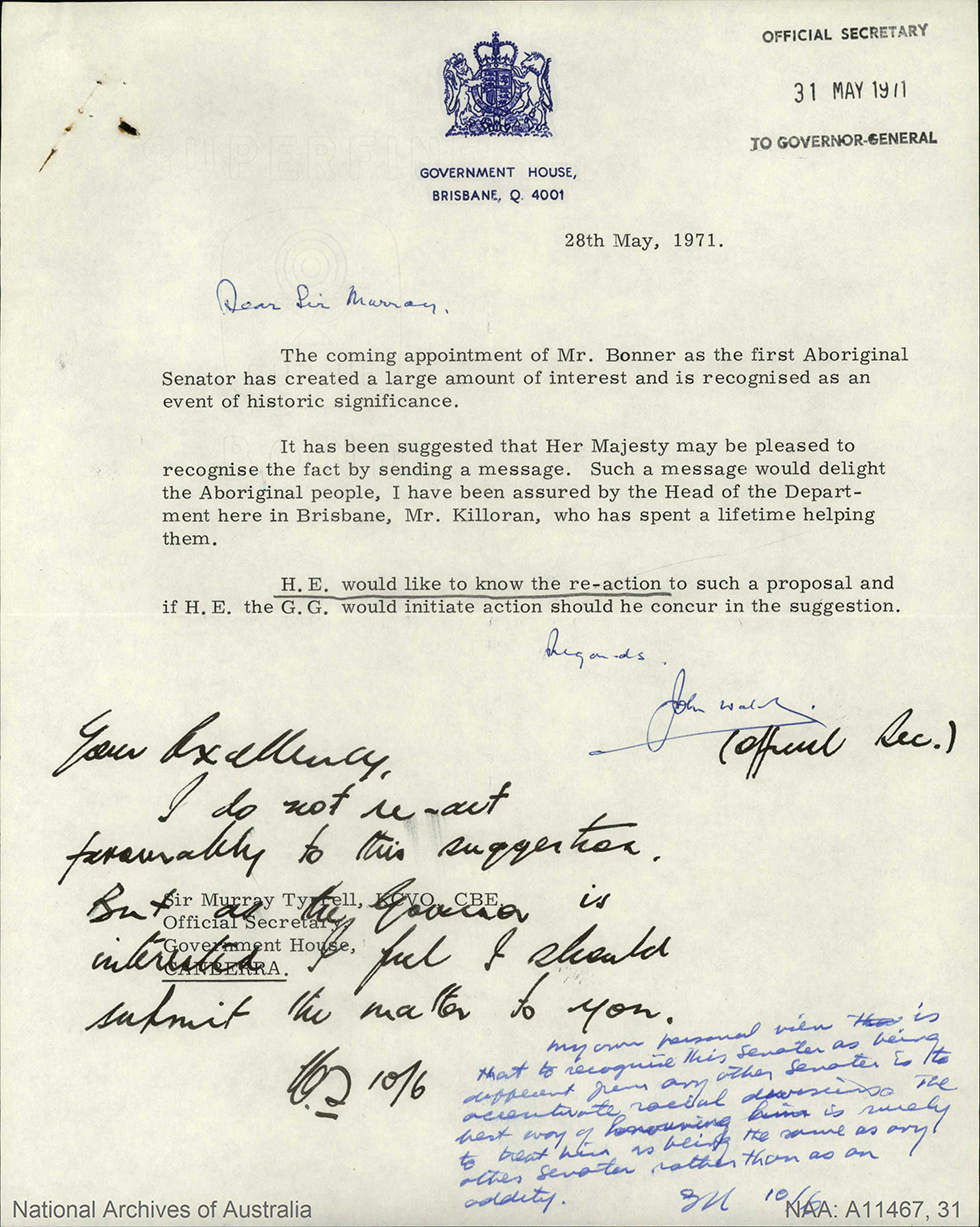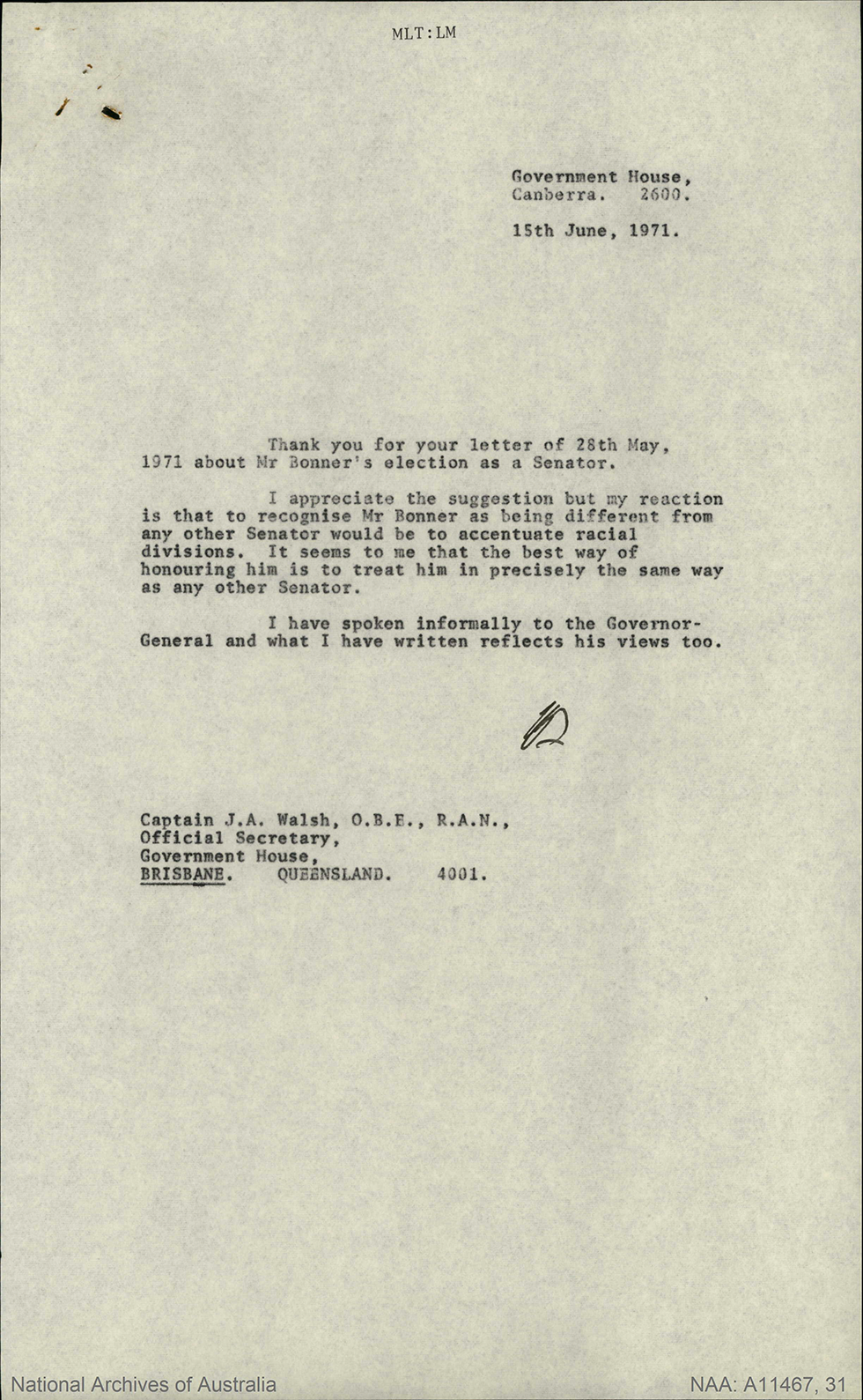

Aboriginal and Torres Strait Islander people should be aware that the National Archives' website and collection contain the names, images and voices of people who have died.
Some records include terms and views that are not appropriate today. They reflect the period in which they were created and are not the views of the National Archives.



[Page 1.]
[Letterhead contains Australian coat of arms and 'GOVERNMENT HOUSE, BRISBANE, Q. 4001'.]
[Stamp, reads: 'OFFICIAL SECRETARY 31 MAY 1971 TO GOVERNOR-GENERAL'.]
28th May, 1971.
[Handwritten, blue ink:] Dear Sir Murray
[Typed text:} The coming appointment of Mr. Bonner as the first Aboriginal Senator has created a large amount of interest and is recognise as an event of historic significance.
It has been suggested that Her Majesty may be pleased to recognise the fact by sending a message. Such a message would delight the Aboriginal people, I have been assured by the Head of the Department here is Brisbane, Mr. Killoran, who has spent a lifetime helping them.
[underlined text:] H.E. would like to know the re-action [end underlined text] to such a proposal and if H.E the G.G would initiate action should he concur in the suggestion.
Sir Murray Tyrrell, KCVO, CBE,
Official Secretary,
Government House,
[underlined] CANBERRA.
[The following section is handwritten in black:
Your excellency, I do not re-act favourably to this suggestion. But as the governor is interested I feel I should submit the matter to you.
[signature]
10/6
(Official Rec.)]
[The following section is handwritten in blue, in a different hand:
Regards, John Walsh.
My own personal view ['that' crossed out] is that to recognise this Senator as being different from any other Senators is to accentuate racial divisions. The best way of honouring him is surely to treat him as being the same as any other Senator rather than as an oddity.
[initials illegible] 10/6.]
[Page 2.]
MLT:LM
Government House,
Canberra. 2600.
15th June, 1971.
Thank you for your letter of 28th May, 1971 about Mr Bonner's election as a Senator.
I appreciate the suggestion but my reaction is that to recognise Mr Bonner as being different from any other Senator would be to accentuate racial divisions. It seems to me that the best way of honouring him is to treat him in precisely the same way as any other Senator.
I have spoken informally to the Governor-General and what I have written reflects his views too.
[handwritten signature.]
Captain J.A. Walsh, O.B.E., R.A.N.,
Official Secretary,
Government House,
BRISBANE. [word underlined.] QUEENSLAND. 4001.
This record is a letter sent to the Governor-General in 1971, with handwritten notes showing the opinions of different government officials. They are discussing their views on whether Neville Bonner should be publicly recognised as the first Aboriginal person to serve in the Australian Parliament.
Neville Bonner was an elder of the Jagera people. He entered the Australian Parliament in the year 1971, when he was appointed by the Queensland Parliament to fill a casual vacancy in the Senate. Aboriginal and Torres Strait Islander people had gained the right to vote in federal elections and sit in federal Parliament only nine years earlier, in 1962.
For his swearing-in at Government House, Canberra, officials decided not to mention that Neville Bonner had made history as the first Aboriginal federal parliamentarian in Australia. As can be seen in the record, it was decided that the best way to honour him was to treat him the same as any other Senator, 'rather than as an oddity’.
It's not clear from the record whether any of the officials involved in the conversation asked Neville Bonner how he would like to be recognised.
Although it was decided to not mention Bonner's race at the swearing-in ceremony, Bonner himself made reference to his identity as an Aboriginal man in the first speech that he gave in the Senate chamber.
In this speech, Neville Bonner said –
For more than 20,000 years my people have loved this country. They have appreciated its beauty and its capacity to provide for human needs. Throughout that long period my race developed many traditions and one generation has passed on to another a respect for these traditions. Traditions are preserved and honoured in the Australian Parliament also.
[…] As an Australian, I am concerned for the future of my country, for the welfare of its people, and for the quality of life that they enjoy. However, I am conscious of the fact that I am the first member of my race to participate in parliamentary proceedings. I am proud that, however long it has taken, this form of participation has been achieved.
Neville Bonner went on to represent Queensland in the Australian Senate for 12 years. Today an official portrait hangs in Parliament House to honour him as the first Aboriginal Senator in Australia. It hangs alongside portraits of other First Nations parliamentarians, including Ken Wyatt, the first Indigenous person to be elected to the House of Representatives in 2010, Nova Peris, the first Indigenous woman to be elected to the Senate in 2013, and Linda Burney, the first Indigenous woman to be elected to the House of Representatives in 2016.
Learn how to interpret primary sources, use our collection and more.
